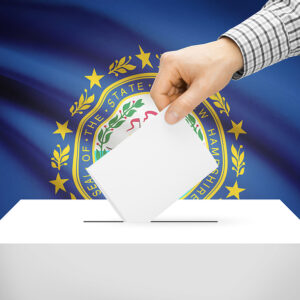As a teenager in Nashua, I volunteered for my first political campaign by knocking on doors in the snow for Sen. John McCain during the 2008 primary. In his victory speech that year, he addressed the residents of our state directly: “I talked to the people of New Hampshire. I reasoned with you. I listened to you. I answered you. Sometimes, I argued with you. But I always told you the truth as best as I can see the truth. And you did me the great honor of listening.”
We’ve all heard the jokes about the demanding nature of Granite State voters. Perhaps the most famous one: The man who told his neighbor that he was not yet sold on Mo Udall for president because he had only met him twice.
New Hampshire voters expect transparency from their candidates, and they demand the same from their elections. The New Hampshire primary is this cycle’s first election that state election officials run. It’s not just the first stop for candidates; it’s the first demonstration of the integrity of our country’s elections in 2024.
New Hampshire has an election system that can stand up to the scrutiny of skeptical voters and the watchful eye of the national media. Thousands of everyday people go through rigorous training before working at the polls on Election Day so that they can determine the eligibility of voters, the ease and accessibility of the voting process, and the accuracy of the count.
New Hampshire’s system is one of transparency, checks, and balances. Many of the ways that New Hampshire manages its elections fit with the best practices outlined in a report by the National Task Force on Election Crises (which is an initiative of Protect Democracy, where I now work) entitled “How Election Officials Are Building Trust and Confirming Election Outcomes.” Among these best practices are the use of paper ballots and the opportunity for public examination of the process before, during, and after voting.
Before Election Day, election officials update voter registration lists by adding newly registered voters and notifying inactive voters that they could be removed from the rolls if they do not indicate both their interest and eligibility to remain registered. To aid in the effort, New Hampshire uses the U.S. Postal Service’s National Change of Address program to track voters who may have moved. State law requires that clerks review the list of deaths for their city or town listed in the New Hampshire Vital Records Information Network and search for possible matches with voter records. In addition, the general public and political parties can examine the process of preparing voting machines, including their “logic and accuracy” tests and certification.
On Election Day, poll workers help voters with every stage of the process, starting with verifying the identity of each voter. Voters cast their votes on paper ballots – which election officials may later tabulate using tested and certified tabulation machines – and fill out those paper ballots with a pen that is provided by the polling location. Paper ballots provide a physical record that can be audited in case of a dispute or a recount.
When it is time to count the votes, authorized representatives of both parties observe the counting process. While hand-counting of ballots is not a best practice for large precincts or counties – or for elections with numerous races on the ballot – many New Hampshire precincts are small enough to count their ballots efficiently and accurately by hand. Other precincts use vote-counting machines that were approved by the New Hampshire Ballot Law Commission after lengthy bidding and review processes and rigorously tested by election officials.
To be sure, no election system is perfect. Human or technological errors may occur, such as the initially inaccurate vote totals from Windham during the 2020 general election, which were discovered during a recount of a state legislative race. An audit authorized by the legislature determined that the cause of that inaccuracy was the faulty folding of ballots. They ruled out bias and provided recommendations to avoid such errors in the future – including routinely conducting risk-limiting audits of election results (another best practice recommended by experts).
New Hampshire administers its elections in a way that includes the crucial ability for the general public and political leaders to examine the process in a responsible way at every stage. This solid process also allows transparency and integrity from the beginning of the administration process through the final tally of the votes. As voters prepare their final vetting of the contenders for the coveted first-in-the-nation primary, they can have confidence in the system in which they cast their ballots.




